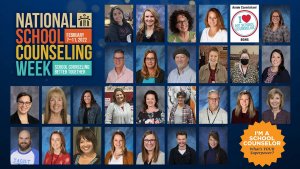School Counselors build bridges to keep students healthy and engaged
Feb. 10, 2022
 Defining the job of a school counselor can be a tricky thing. Deborah Wood, counselor at Glenwood Heights Primary, says it’s “like an umbrella,” touching on many parts of a school’s social-emotional learning supports.
Defining the job of a school counselor can be a tricky thing. Deborah Wood, counselor at Glenwood Heights Primary, says it’s “like an umbrella,” touching on many parts of a school’s social-emotional learning supports.
“We want to make sure that all children get support,” Wood said. “Through a comprehensive counseling program they receive academic and social-emotional development and have exposure to career readiness.”
Feb. 7-11 is School Counseling Week, a chance to recognize the integral part that these professionals play in helping students achieve emotional and academic success. School counselors are often among the first to recognize and address the social-emotional needs of students. They also act as academic and career advisors.
In 2021, the Washington legislature passed Substitute Senate Bill 5030, mandating a “comprehensive school counseling program” be in place by the start of the 2022-23 school year. The goal was to create a framework that is aligned with state standards for social-emotional support, academic development and career readiness.
Battle Ground Public Schools is ahead of the initiative. For example, the district added counselors at the primary level in 2018. They are key members of each building’s Positive Behavioral Interventions and Supports (PBIS) team that focuses on teaching behavioral expectations, reinforcing them through the use of specific acknowledgement systems.
“Every student gets the same amount of expectations and teaching,” Wood said. “And then the school counselor can provide additional support and teaching to ensure understanding.”
“The needs that school counseling addresses can not be understated in the school setting,” said Deputy Superintendent Shelly Whitten. “Through the support of these counselors, students gain emotional coping skills that help them become ready to learn academically. Many of these strategies and skills will continue to benefit them throughout their lives.”
Counselors work closely with school psychologists and administrators to recognize potential behavioral or academic issues as early as possible. Schools use a tiered support system to help students adjust and manage. The system aims to first set expectations, then helps students learn to self-regulate and manage their emotions. Counselors and psychologists work together to determine if student behavior needs further intervention. That usually includes conversations with parents or guardians to set up a plan. Students can be assigned to a daily check-in process to make sure they are meeting expectations and determine if further help is needed.
“In a comprehensive school counseling model, you would look and see how that intervention is progressing,” Wood said. “Is that student learning those skills that are needed? If not, then maybe they need another layer, a different type of intervention.”
“Counselors have been critical during the pandemic and as we emerge from it,” added Whitten. “Their knowledge has supported the identification of students suffering from increased stress and then getting them the support they need, even at a time when fewer people than ever are entering the mental health profession.”
At all grade levels, counselors utilize the school’s academic, attendance, and discipline data to drive decisions with the goal of supporting students and closing achievement gaps.
In middle school, counselors are trained in assisting students through challenging developmental years. These include intervention prevention specialists and the use of academic, attendance and discipline data. Middle school counselors also bridge the gap between primary and high school grade levels; first helping primary students with the transition to middle school, and then working with high school counselors to forecast eighth graders for high school classes and developing activities that ensure a smooth transition to the high school experience.
High school counselors assist students with making a number of important decisions about their futures and ensuring they are enrolled in classes that meet graduation requirements. They also work to continue the development of programs and interventions to support student success and readiness for post secondary education and careers.
The long-term goal is to build a foundation of trust with students and parents or guardians. Wood recounted a recent situation where a student had lost a relative in another country, leading to some struggles with focusing in class. “We talked about her memories and built a memory book,” she said. “Just helping her through the grieving process and building those skills made a difference.”
The comprehensive counseling model outlined by SB 5030 aims to create a support system that can be more proactive and less reactive when it comes to preparing students for academic success.
“The goal is to best figure out how, academically, emotionally and otherwise, to get them successful and career or college ready,” Wood said. “You know, healthy adults.”










 11104 N.E. 149th Street,
11104 N.E. 149th Street,